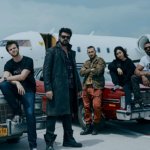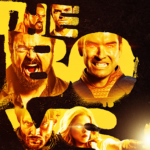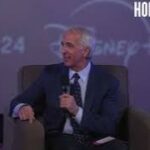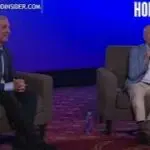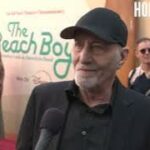Table of Contents
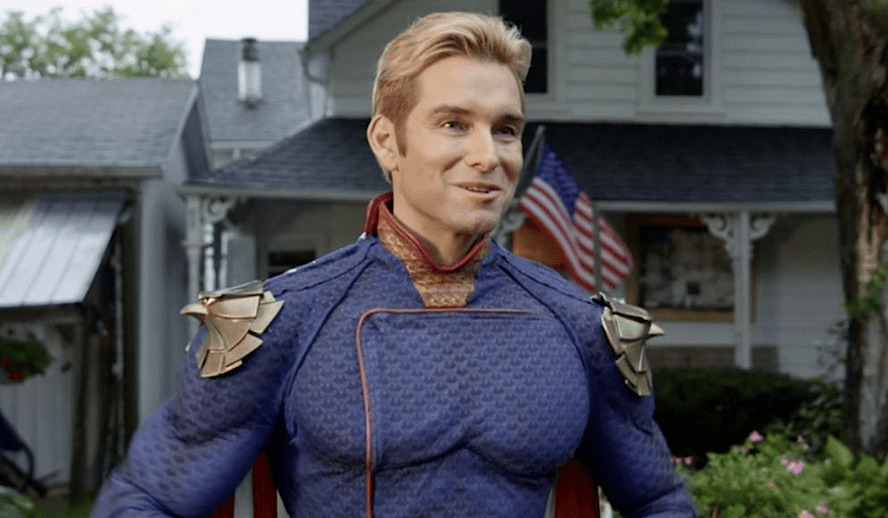
Photo: ‘The Boys’/Amazon
After his girlfriend is brutally killed by a superhero, Hughie (Jack Quaid) is recruited by an underground group called The Boys whose purpose is to expose the “Seven”, the world’s most famous superheroes. The Boys is a refreshing and gleefully inappropriate satire of the superhero genre. It boasts one of the best villains in recent memory in Homelander (Anthony Starr) as well as a grabbing premise. It falls short in a number of areas behind the screen, but with more focus in its third season, it could become something special.
Homelander – A Wicked Villain
What if Superman was evil? Well, he’d be Homelander, aka the main reason to watch The Boys. Homelander is a famous superhero who presents a friendly, all-American charm (his cape IS the American flag) to the public but whose deep sociopathy becomes increasingly apparent on the inside. His invincibility is genuinely terrifying- every time he is on the screen you fear for those around him. His kills are unpredictable, and the first season does a particularly good job of establishing the shocking lengths he can go to. His narcissistic and domineering presence is as fun to watch as it is frightening, and Anthony Starr plays this duality brilliantly. It is rare that you see a performance this suited to a particular actor- I could not imagine anyone else playing Homelander.
Related article: The Boys Series vs. The Umbrella Academy: Which Superhero Show Reigns Supreme?
Homelander is also nuanced, at least for a character as reprehensible as he is. His aims are believable. He craves adoration yet clearly has a deep disdain for those who love him. He isn’t particularly enthusiastic about the killings he carries out at America’s behest, but boy does he kill. His apathy is similar to Dr. Manhattan’s in Watchmen, yet it is far more malicious. As a foil to the Boys, Homelander is perfect. You desperately want him to lose yet you really can’t see a way in which he does. How would one kill Superman? The impossibility of this premise works against The Boys in other ways, but it crucially makes for a fantastic villain and an engaging scenario. Not only is Homelander a great foil for the show, but he also has the potential to become one of television’s all-time great villains, alongside characters like King Joffrey, Stringer Bell, and Gustavo Fring. The Boys is entertaining in other ways but Homelander is its only exceptional feature.
Still, some of the other characters are intriguing. Aside from Homelander “The Seven” harbours some similarly reprehensible personalities. The Deep is incredibly seedy and his downfall is very entertaining. A-Train is also delightfully unlikeable, particularly in the first season (This will be apparent from minute one). The fact that the Seven are so hate-inducing makes the conflict inherently engaging; you cannot wait to see them go down. Some of the good guys are also worth rooting for, particularly in Season One. Jack Quaid is witty as Hughie and brings a sense of observational charm as the straight man thrown into a world of chaos. Billy Butcher (Karl Urban) is the Boys’ biggest personality and is often hilarious once you get past the oddity of his accent.
Subscribe to Hollywood Insider’s YouTube Channel, by clicking here.
A Reflective Superhero Story
The Boys is a good satire of the superhero genre. The Seven are themselves a direct knock-off of the Justice League (There are countless jibes at the DCEU, and Marvel); Homelander is Superman, Queen Maeve is Wonder Woman, and so on and so forth. Rather than being fetishised à la Zack Snyder, the costumes are deliberately tacky and like Kick-Ass before it, the inherent ridiculousness of the superhero is foregrounded. The Boys’ central innovation is to present superheroes as equally volatile and corruptible as normal human beings. They swear, use people for sex, take physical advantage of others, and are slaves to corporate greed in the same way that we are, simply more so. Their powers are used by a corporation to sell merchandise and by the government to protect America. This is an inherently fun premise, not least because it presents a philosophically plausible scenario within the genre- if superheroes were real, they would surely entertain unheroic exploits.
Gore and Gills- A Gleefully Inappropriate Romp
Another strength of The Boys is its gleefully nihilistic tone. The show loves to revel in inappropriate content, and for the most part, this works to its credit. The kills are unbelievably over the top, each one gorier than the last. Most of the violence is played comedically, though it is occasionally dramatically effective, as with the now-famous plane scene. The sex scenes aren’t just sex scenes, they make sure to be as strange as possible- Homelander has a truly weird maternal complex and the Deep’s exploits are equally cringe-inducing. The writers make sure to showcase the superheroes’, shall we say, unique abilities in regards to sex and violence, which in doing so gives the show a badly-behaved, deranged appeal.
Related article: The Power of Positivity: Ikorodu Bois + Chris Hemsworth + Russo Brothers + Sam Hargrave
Limited Time Offer – FREE Subscription to Hollywood Insider – Click here to read more on Hollywood Insider’s vision, values and mission statement here – Media has the responsibility to better our world – Hollywood Insider fully focuses on substance and meaningful entertainment, against gossip and scandal, by combining entertainment, education, and philanthropy.
The characters are equally adept at dark humour. Butcher has some hilarious lines – “I’ll squeeze your balls, and I won’t let go, even if you ask me to” being my favourite. Though scary, Homelander’s sociopathy is also darkly comic. The artifice of his friendliness is played with stinging irony by Starr and works well, particularly during his jingoistic speeches to the American public. Black Noir is also comedically underdeveloped, and his totally silent scenes work nicely.
Too Tongue In Cheek?
The show is incredibly self-aware, and as aforementioned this mostly bodes well for its entertainment value. However, its tongue-in-cheek quality can also be annoying and seems to occasionally disguise weak writing. The jibes against the DCEU are funny but it is apparent that the show suffers from similar narrative problems, such as the need to keep characters alive to prolong longevity. The show contains social commentary, but this occasionally comes across as unsubtle (A few female characters enter a fight and a character feels the need to literally say “Girls Do Get It Done”). Its satire is often funny but it is often aimed at easy targets (ie Nazis, white supremacists). Part of The Boys’ innovation is its self-awareness, but after a while, you realise that at times it is simply spelling out the obvious. Still, its commentary is effective in other areas, like Homelander’s role in foreign policy. The Boys’ social messaging is good enough to enhance its watchability but it needs to sharpen up in order to be considered successful as a satire.
Related article: Hollywood Insider’s CEO Pritan Ambroase: “The Importance of Venice Film Festival as the Protector of Cinema”
Related article: Live Updates: List of Successes From Black Lives Matter Protests!
Get On Homelander’s Level!
Another problem with the show links back to my love of Homelander: no other character in The Boys is even remotely as engaging as he is. Hughie is initially the protagonist yet he disappears into obscurity in Season Two. Butcher is definitely the next most interesting “hero” yet he works much more as a comedically poorly-accented vehicle of mayhem than as a real person. That being said he was well served by the Season 2 finale, so there is promise. Mother’s Milk is likable but his character amounts to little more than the stereotypically “badass-yet-wise-black-guy”. The weakest of the Boys is Frenchie. As you may have guessed by his name, he is French. In case that wasn’t enough, he speaks in an overcooked accent which sounds suspiciously like it originates from foreign soil (Israel, to be precise), and even wears the French rugby shirt. At all times we must be reminded that Frenchie is indeed – French. The writers do try to inject some pathos into his arc through his relationship with Kimiko, but when all I can think about is his nationality makes it difficult to care for him.
Where the Seven are concerned, Starlight’s innocent-girl-gone-rogue routine is eventually tiresome, even though she is sweet. Maeve, A-Train, and the Deep are all similarly two-dimensional. Season Two newcomer Stormfront is very well played by Aya Cash and is suitably reprehensible, though the nature of her origin is too rushed given how radical it is. Black Noir isn’t really even a character, though he gets a pass because his lack of personality is deliberate and often hilarious. I am still interested in seeing where these characters go, I am merely arguing that in comparison to Homelander they are poorly written, and when you have evidence that the writers can do better it is only right to hope for improvement.
Related article: Ryan Reynolds: 32 Facts on the Comic ‘Deadpool’ Superhero Royalty
Related article: Marvel Cinematic Universe: 32 Marvel Movies Facts From ‘Iron Man’ to ‘Avengers’ in the MCU
Increasingly Inconsistent In Quality
The plot also suffers from inconsistency, particularly in Season Two. Where Season One remained fairly focused on The Boys vs Vought, Two meanders. Homelander’s relationship with the public fluctuates from a critical stage at one point to being lackadaisically abandoned. Season Two has many different plot strands, some of which are interesting (like the exploding heads), yet all of which become slightly muddled. There is certainly a lack of focus in comparison to the show’s first effort; vital elements from Season One like Hughie’s revenge and Butcher’s familial situation are relegated. This creates the feeling that certain characters are stagnating, which is occasionally frustrating.
Most jarringly, in Season Two the Boys frequently escape encounters with the “Supes” that they simply shouldn’t be escaping. The threat of “online exposure” is used way too often as a narrative tool of survival. Starlight’s situation also becomes extremely implausible by the end of the second season. The more the script gives its heroes convenient escapes, the less the threat seems palpable.
Dialogue is another area where the show sometimes fails to meet its potential. In many ways The Boys is cinematic, yet its often staged dialogue reminds you that you are watching television. It is often clear that communication serves to move the story forward rather than appearing like natural interaction between people. When a character needs another character to do something, they often tell them their backstory, find common ground, and then they do that thing. This is a feature that is incredibly repetitive, and the show’s big moments would benefit from more naturalistic interactions and visual storytelling in the future.
‘The Boys’’ Future
Despite these supposed flaws, The Boys is still tremendous fun. It is also possible that I am being overly critical about a show that isn’t setting particularly lofty storytelling standards. However, on the evidence of Homelander, The Boys has the potential to become a greater show than it currently is, which should be its aim. If Season 3 can find more focus it could still become something truly worth remembering.
Click here to read Hollywood Insider’s CEO Pritan Ambroase’s love letter to Black Lives Matter, in which he tackles more than just police reform, press freedom and more – click here.
An excerpt from the love letter: Hollywood Insider’s CEO/editor-in-chief Pritan Ambroase affirms, “Hollywood Insider fully supports the much-needed Black Lives Matter movement. We are actively, physically and digitally a part of this global movement. We will continue reporting on this major issue of police brutality and legal murders of Black people to hold the system accountable. We will continue reporting on this major issue with kindness and respect to all Black people, as each and every one of them are seen and heard. Just a reminder, that the Black Lives Matter movement is about more than just police brutality and extends into banking, housing, education, medical, infrastructure, etc. We have the space and time for all your stories. We believe in peaceful/non-violent protests and I would like to request the rest of media to focus on 95% of the protests that are peaceful and working effectively with positive changes happening daily. Media has a responsibility to better the world and Hollywood Insider will continue to do so.”
Vote with a conscience – Register to Vote – Your vote saves lives and ends systemic racism
Ways to support Black Lives Matter Movement to end systemic racism
More Interesting Stories From Hollywood Insider
– Want GUARANTEED SUCCESS? Remove these ten words from your vocabulary| Transform your life INSTANTLY
– Compilation: All James Bond 007 Opening Sequences From 1962 Sean Connery to Daniel Craig
– Do you know the hidden messages in ‘Call Me By Your Name’? Find out behind the scenes facts in the full commentary and In-depth analysis of the cinematic masterpiece
– A Tribute To The Academy Awards: All Best Actor/Actress Speeches From The Beginning Of Oscars 1929-2019 | From Rami Malek, Leonardo DiCaprio To Denzel Washington, Halle Berry & Beyond | From Olivia Colman, Meryl Streep To Bette Davis & Beyond
– In the 32nd Year Of His Career, Keanu Reeves’ Face Continues To Reign After Launching Movies Earning Over $4.3 Billion In Total – “John Wick”, “Toy Story 4”, “Matrix”, And Many More
Homelander, Homelander, Homelander, Homelander, Homelander, Homelander, Homelander, Homelander, Homelander, Homelander, Homelander, Homelander, Homelander, Homelander, Homelander, Homelander, Homelander, Homelander, Homelander, Homelander, Homelander, Homelander, Homelander, Homelander
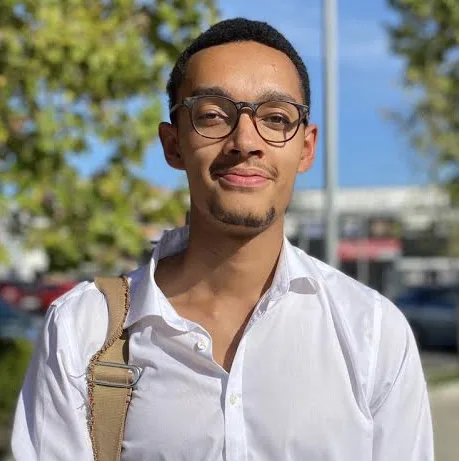
Amhara Chamberlayne is a graduate in English Literature from Warwick University who shares Hollywood Insider’s passion for cinema. When he is not watching films he is writing about them. Uninterested in gossip and agenda, Amhara instead believes in sharing his honest individual reaction to cinema. He enjoys the multi-variant reactions films elicit and believes his take is just as valid as others. For Amhara, the joy lies in the exchange of opinions.

